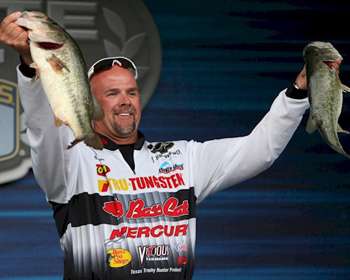
When it comes to talking about the latest wrinkles in fishing tackle, terminal tackle is often passed over in favor of custom-painted crankbaits, swimbaits and hand-poured plastics. The standard bullet weight and egg sinker just don't have enough flash and gaudiness to generate a spirited discussion. But with the recent influx of tungsten in bass fishing, weights are becoming noticed. So, why all the buzz around tungsten?
"Tungsten is a denser material than lead. That means that it's harder than lead and it 'translates' bottom composition and structure," says Elite Angler Marty Stone. "When you're fishing laydowns, rock, clay bottoms or sand, tungsten gives you a better idea of what your bait is doing down there."
Stone, who is sponsored by Tru-Tungsten, is a diehard believer in tungsten weights. "Whether I'm flipping or dragging a Carolina rig in 30 feet of water, tungsten allows me to feel more bites," he explains. "The second I lose contact with the bottom, that tells me a bass has the bait, so I'm able to identify strikes sooner." When he used to fish lead weights, the lead had a tendency to soften his feel underwater. "I couldn't tell what type of bottom I was fishing or when my bait was bouncing off small pieces of cover," he explains. "Tungsten helps me understand what's going on."
While tungsten may seem like a high-tech tackle accessory that benefits only the most experienced bass anglers, Stone says the opposite is true. "I think novice anglers actually benefit more from fishing with tungsten," he says. "You can give an Elite Series angler lead sinkers and he's still going to catch bass. Give someone who isn't comfortable with a Texas or Carolina rig a tungsten weight, and he's going to feel bites he never would have felt with lead." By fishing with tungsten weights, Stone is looking to garner a few extra bass over the long term. "It gives me the slight edge where hopefully I'll feel one or two more bites," he explains. "For the novice, it can be the difference between catching fish and not catching fish."
Stone offers the analogy of aluminum and wooden baseball bats to make his point. "The best bat is an aluminum bat. That's why you see high school and college players using them. The pros can still hit with a wooden bat, but they'd hit the ball a lot farther with an aluminum." Sound is another benefit of tungsten, according to Stone. When making contact with hard bottom, tungsten emits a unique sound that is similar to a jig rattle. "Tungsten has a loud ticking and clacking sound when it hits rock," he explains.
"Do I think that makes a difference? Absolutely. Can I prove that it gets more bites? Maybe not, but I've heard it myself and there's a very distinct sound." Because of tungsten's density, it is much smaller than it's lead counterpart. This feature allows Stone to make accurate casts in windy conditions. "You can be a lot more precise in flipping and pitching situations. The larger the weight, the less accurate you're going to be," says Stone.




